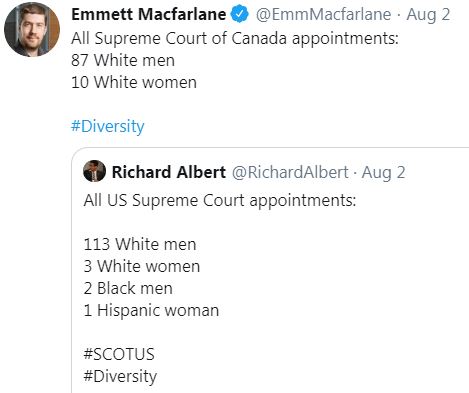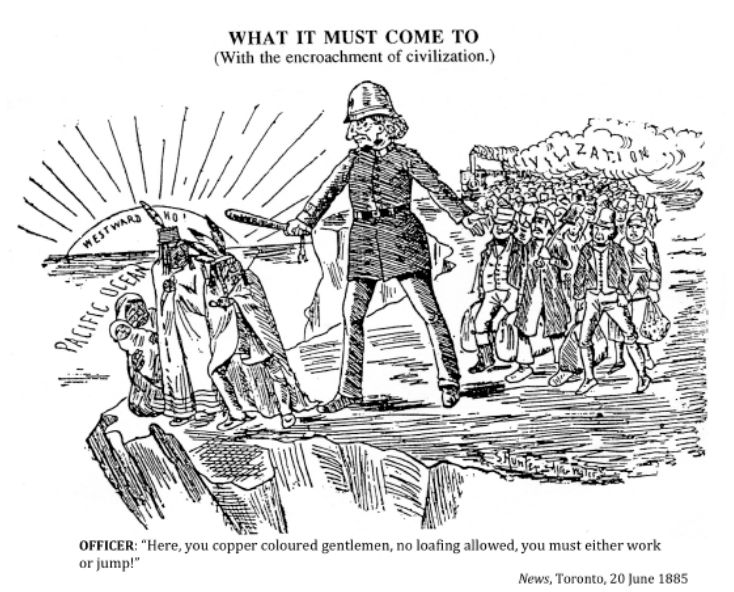
Trying to repair Canada’s racist misogynistic “justice” reputation around the world?
When will the order come to fix systemic misogyny in Canada’s male-dominated “justice” industry? And when will the order come making it illegal for law societies (“regulator” of lawyers) to licence known convicted pedophiles?
Tackle systemic discrimination in Canadian courts, Justin Trudeau tells justice minister by Jacques Gallant, Legal Affairs Reporter, Feb. 3, 2021, Toronto Star
In a new mandate letter from the prime minister, Justice Minister David Lametti has been tasked with bringing in reforms to combat the overrepresentation of Indigenous and Black people in the criminal justice system.
Will the government succeed?
Given the Liberals’ track record on justice reform over the last five years, there is little optimism that this new priority will lead to meaningful change, critics say.
For true reform to happen, the government will need to make changes that are evidence-based and backed by sustained funding, they say.
“The over-incarceration of Black and Indigenous people has been offensively high for decades, so this wasn’t something that came as a surprise,” said Daniel Brown, vice-president of the Criminal Lawyers’ Association.
“And yet rather than enacting laws over the last five years (the government) has been in power to address these concerns, they’ve been distracted by other justice initiatives that didn’t need tweaking.”
The mandate letter from Prime Minister Justin Trudeau, released in January, outlines priorities that are in addition to priorities already included in Lametti’s previous mandate letter from 2019. These include the creation of an independent commission to review potential wrongful convictions.
The top priority in the new mandate letter instructs Lametti to introduce legislation and make investments “to address systemic inequities in the criminal justice system,” recognizing that the system disproportionately impacts Indigenous and Black people.
“Indigenous peoples and Black Canadians experience systemic discrimination and disproportionate outcomes at all stages of our criminal justice system. They are also disproportionately represented as victims of crime,” said Lametti’s spokesperson Rachel Rappaport in a statement to the Star.
“We have a responsibility to take a hard look at the many factors that contribute to this and take concrete action to end it.”
In 2015, the same year the Liberals were elected, Indigenous people represented 24 per cent of the federal inmate population, despite Indigenous people making up 4.3 per cent of the Canadian population. The proportion of Indigenous people in prison surpassed 30 per cent in 2020, according to Canada’s correctional investigator.
Black people represented 7.2 per cent of federal offenders in 2018-2019 according to the government’s latest statistics. About 3.5 per cent of Canadians identified as Black in the 2016 census.
Among other things, Lametti’s new mandate letter highlights promoting the use of “pre- and post-charge diversion,” which can include counselling or community service that individuals can access instead of being formally charged with a criminal offence or instead of being prosecuted.
Lawyers and academics have said diversion is crucial so that more people can avoid having contact with the justice system. ![]() In my view and direct experiences (that cost me hundreds of thousands of dollars and many years of my life), avoiding it, is vital to one’s health. Besides, it’s not a “justice” system; it’s an elitist dishonest boys club (even my “public interest” ex lawyers, Murray Klippenstein and Cory Wanless can’t stick to the truth). “Justice” is inaccessible for most Canadians; it’s a pipe dream like Keystone XL is to Donald Trump, Jason Kenney and Steve Harper. In my view, judges, lawyers and main media need it called a “justice” system to con Canadians into believing it serves justice, so as to enable the status quo and keep paychecks rolling in for the mostly male white privileged. The club enables racism, rape (and revictimizes rape victims), misogyny, bigotry, industrial crimes and other elite nastiness. It’s more fitting to call it the judicial industry – an exorbitantly expensive, unfair, unjust, inefficient and paper wasting (intentional?), biased industry that is weaponized with procedure to maintain injustice, and serves the rich well. It’s a sick industry paid for by taxpayers that needs one hell of a lot more repair than a letter.
In my view and direct experiences (that cost me hundreds of thousands of dollars and many years of my life), avoiding it, is vital to one’s health. Besides, it’s not a “justice” system; it’s an elitist dishonest boys club (even my “public interest” ex lawyers, Murray Klippenstein and Cory Wanless can’t stick to the truth). “Justice” is inaccessible for most Canadians; it’s a pipe dream like Keystone XL is to Donald Trump, Jason Kenney and Steve Harper. In my view, judges, lawyers and main media need it called a “justice” system to con Canadians into believing it serves justice, so as to enable the status quo and keep paychecks rolling in for the mostly male white privileged. The club enables racism, rape (and revictimizes rape victims), misogyny, bigotry, industrial crimes and other elite nastiness. It’s more fitting to call it the judicial industry – an exorbitantly expensive, unfair, unjust, inefficient and paper wasting (intentional?), biased industry that is weaponized with procedure to maintain injustice, and serves the rich well. It’s a sick industry paid for by taxpayers that needs one hell of a lot more repair than a letter.![]()
While the actual management of diversion programs is a provincial responsibility, University of Toronto criminologist Akwasi Owusu-Bempah said the federal government could provide sustainable funding to allow these programs to grow, which he said should be culturally appropriate.
Criminal defence lawyer Annamaria Enenajor said the problem now is that diversion is at the discretion of the police or prosecution. She said the federal government should make it mandatory for certain offences, such as minor bail breaches, which tend to clog up the system.
“The government’s record for passing legislation that has resulted in transformations that have meaningfully improved the lives of Indigenous People and Black people has not been good,” she said.
“Their legislation are a political compromise and attempts to pander to various special interest groups and knee-jerk responses to unique flashpoints of public outrage that are the subjects of news stories of the day.”
As an example, she pointed to changes the government made to jury selection rules in the wake of the Gerald Stanley trial in Saskatchewan in 2018. Stanley, a white man, was acquitted by a jury of second-degree murder in the shooting death of 22-year-old Indigenous man Colten Boushie.
Media reports at the time said that the defence was using what were known as “peremptory challenges” to dismiss any potential juror who appeared Indigenous.
Peremptory challenges allowed both Crown and defence lawyers to dismiss a certain number of potential jurors during jury selection without having to give a reason. After the Stanley acquittal, the federal government abolished the challenges.
Organizations representing racialized lawyers have argued the change actually makes it more difficult for a person of colour to get a fair trial by jury.
They point out that people of colour accused of a crime often used the challenges to help ensure people with perceived biases didn’t make it on to the jury that would ultimately decide their fate — in a system where jury pools remain significantly white.
(Lametti’s office pointed to its jury selection changes as a positive step to making juries more representative of the communities they serve.)
Critics also point to the Liberals’ failure to repeal mandatory minimum sentences, which they argue has led to the over-incarceration of Black and Indigenous offenders. ![]() Gotta keep John A. MacDonald and his ilk happily drinking and dancing!
Gotta keep John A. MacDonald and his ilk happily drinking and dancing!![]()
Sentencing reform is also highlighted in Lametti’s new mandate letter; the justice minister has previously said the government is “committed to advancing sentencing reform that will stand the test of time.”
“The fact that the government hasn’t repealed those mandatory minimum sentences raises questions about the extent to which it’s serious about tackling systemic injustice in our justice system,” said Owusu-Bempah.
“Repealing those mandatory minimum sentences would send a message that the government is serious about addressing systemic inequalities in our justice system.”
The letter:
Minister of Justice and Attorney General of Canada Supplementary Mandate Letter
January 15, 2021

Dear Mr. Lametti:
Thank you for continuing to serve Canadians as Minister of Justice and Attorney General of Canada.
Since my previous mandate letter to you, our country has been confronted by the most serious public health crisis we have ever faced. The global pandemic has had devastating impacts on lives and livelihoods and exposed fundamental gaps in our society. Challenges that existed before the pandemic remain and others have been exacerbated. In light of these realities, I am issuing this supplementary letter to outline further responsibilities and considerations that I expect you to undertake on behalf of Canadians. Nothing in this letter replaces any previous commitments or expectations. It is necessary for us to continue making progress on the commitments laid out in 2019, while ensuring our actions are centred on fighting the pandemic and building back better.
Even as we continue to distribute vaccines across Canada, bold action continues to be required to fight this pandemic, save lives, support people and businesses throughout the remainder of this crisis and build back better. We need to work together to protect and create jobs, and to rebuild our country in a way that will create long-term competitiveness through clean growth. As articulated in the Speech from the Throne 2020 and Fall Economic Statement 2020, our four main priorities for making tangible progress for Canadians continue to be: protecting public health; ensuring a strong economic recovery; promoting a cleaner environment; and standing up for fairness and equality. ![]() Why not a “clean” environment? Canada already too polluted by big oil and gas and mining to recover?
Why not a “clean” environment? Canada already too polluted by big oil and gas and mining to recover?![]()
Ongoing struggles around the world – and here at home – remind us of how important it is to keep working toward a brighter future. We are at a crossroads and must keep moving Canada forward to become stronger, more inclusive, and more resilient. It is part of your job to look out for Canadians, with particular attention to our most vulnerable.
We need to continue delivering on our commitments by working together in a positive, open and collaborative way with Parliamentarians, with partners and with all Canadians. Where legislation is required, I expect you to continue working with the Leader of the Government in the House of Commons to make progress for Canadians within this minority Parliament.
To be ready for what lies ahead, our Government must continue to be agile and use the best available science and evidence. Canadians are counting on us to ensure that today’s policies, programs and services are calibrated and targeted to match their needs. Therefore, I expect you to uphold our ongoing commitment to delivering real results and effective government for the people we are elected to serve.
Many of our most important commitments continue to require a sustained partnership with provincial, territorial and municipal governments, and Indigenous partners, communities and governments. Always remember that our mandate comes from citizens who are served by all orders of government, and that it is in everyone’s interest that we work together to find common ground and make life better for Canadians. The President of the Queen’s Privy Council for Canada and Minister of Intergovernmental Affairs is the Government-wide lead on all relations with the provinces and territories.
There remains no more important relationship to me and to Canada than the one with Indigenous Peoples. With respect and dignity, we remain committed to moving forward along the shared path of reconciliation. You, and indeed all ministers, must continue to play a role in helping to advance self-determination, close socio-economic gaps and eliminate systemic barriers facing First Nations, Inuit, and Métis Peoples. As Minister, I expect you to work in full partnership with Indigenous Peoples and communities to advance meaningful reconciliation.
The Government has significantly increased spending during the pandemic in order to achieve our most pressing priority: to help protect Canadians’ health and financial security. Going forward, we must preserve Canada’s fiscal advantage and continue to be guided by values of sustainability and prudence. Therefore, our actions must focus on creating new jobs and supporting the middle class to preserve the strength of our economy.
While fighting the pandemic must be our top priority, climate change still threatens our health, economy, way of life and planet. Clean growth is the best way to create good jobs and power our long-term economic recovery. I expect you and all ministers to pursue complementary partnerships and initiatives that will support our work to exceed our emissions reduction target, seize new market opportunities to create good jobs and prepare our country to adapt to the impacts of a changing climate.
We remain committed to evidence-based decision-making ![]() Pffft! With Canada’s top court knowingly publishing fabricated shit in rulings, how is evidence-based decision making possible?
Pffft! With Canada’s top court knowingly publishing fabricated shit in rulings, how is evidence-based decision making possible?![]() that takes into consideration the impacts of policies on all Canadians and fully defends the Canadian Charter of Rights and Freedoms.
that takes into consideration the impacts of policies on all Canadians and fully defends the Canadian Charter of Rights and Freedoms. ![]() Frac Shit! Our charter is like the rest of our laws in this bitumen and leaking methane polluted country – defended when it suits the rich few or some political-judicial-corporate need of the day. Criminals have charter rights, non-criminal Canadians harmed by the oil and gas industry do not. Canada’s top court of Steve Harper (his gov’t appointed 7/9 of the judges that heard my appeal) took a smelly dump on our Charter in their ruling in Ernst vs AER, damaging it. When comes the order to fix it?
Frac Shit! Our charter is like the rest of our laws in this bitumen and leaking methane polluted country – defended when it suits the rich few or some political-judicial-corporate need of the day. Criminals have charter rights, non-criminal Canadians harmed by the oil and gas industry do not. Canada’s top court of Steve Harper (his gov’t appointed 7/9 of the judges that heard my appeal) took a smelly dump on our Charter in their ruling in Ernst vs AER, damaging it. When comes the order to fix it?![]()
You will apply Gender-based Analysis Plus (GBA+) in the decisions that you make and consider public policies through an intersectional lens in order to address systemic inequities including: systemic racism; unconscious bias; gender-based discrimination; barriers for persons with disabilities; discrimination against LGBTQ2 communities; and inequities faced by all vulnerable populations. Whenever possible, you will work to improve the quality and availability of disaggregated data to ensure that policy decisions benefit all communities.
It is clear that this pandemic has disproportionately affected different communities throughout our country. Therefore, we must ensure our recovery includes all Canadians, with an emphasis on supporting those most affected. To this end, I expect that you will seek the advice and hear the perspectives of a diverse group of Canadians, in both official languages. Moreover, you will continue to rely on and develop meaningful relationships with civil society and stakeholders, including businesses of all sizes, organized labour, the broader public sector and the not-for-profit and charitable sectors across Canada.
Now more than ever, Canadians are relying on journalists and journalism for accurate and timely news, especially in the face of a concerning spread of misinformation. I expect you to foster a professional and respectful relationship with journalists to ensure that Canadians have the information they need to keep themselves and their families safe.
Our ability to implement our Government’s priorities depends on consideration of the professional, non-partisan advice of public servants. Government employees perform their duties in service to Canada, with a goal of improving our country and the lives of all Canadians. I expect you to maintain a collaborative working relationship with your Deputy Minister, whose role, like the role of the public servants under their direction, is to support you in the performance of your responsibilities.
Important ministerial responsibilities have been entrusted to you, notably delivering on the Government’s commitments that were set out in your 2019 mandate letter. I expect that you will keep me updated and proactively communicate with Canadians on the progress you are making toward our priorities. Always know that you can turn to me, and the Deputy Prime Minister, at any time for support.
In addition to the priorities set out in my mandate letter to you in 2019, as Minister of Justice and Attorney General of Canada, you will implement on a priority basis the following commitments, as set out in the Speech from the Throne 2020 and building off the investments in the Fall Economic Statement 2020:
- In recognition of disproportionate impacts on groups including Indigenous Peoples and Black Canadians, introduce legislation and make investments that take action to address systemic inequities in the criminal justice system, including to promote enhanced use of pre- and post-charge diversion and to better enable courts to impose sentences appropriate to the circumstances of individual cases. You will be supported in this work by the Minister of Crown-Indigenous Relations, the Minister of Indigenous Services, the Minister of Diversity and Inclusion and Youth, the Minister for Women and Gender Equality and Rural Economic Development, the Minister of Northern Affairs and the Minister of Public Safety and Emergency Preparedness.
- With the support of the Minister of Crown-Indigenous Relations, ensure passage of the co-developed legislation to implement the United Nations Declaration on the Rights of Indigenous Peoples.
- Work with the Minister of Seniors to establish new offences and penalties in the Criminal Code related to elder abuse and neglect.
- Continue to support the Minister of Public Safety and Emergency Preparedness in implementing our firearms commitments.
- Continue work to further ensure the Bench is reflective of Canada’s diversity, and improve methods of tracking progress.
 Canada has a long long long way to go to reflect diversity on the Bench! Refer to one sample of “white” judicial stats below. And, it needs to clean house at the bottom too, and rid its regulators (law societies) of racist misogynistic board members.
Canada has a long long long way to go to reflect diversity on the Bench! Refer to one sample of “white” judicial stats below. And, it needs to clean house at the bottom too, and rid its regulators (law societies) of racist misogynistic board members.
- Work with the Minister of Canadian Heritage and the Minister of Public Safety and Emergency Preparedness to take action on combatting hate groups and online hate and harassment, ideologically motivated violent extremism and terrorist organizations. You will be supported in this work by the Minister of Diversity and Inclusion and Youth, the Minister for Women and Gender Equality and Rural Economic Development and the Minister of Innovation, Science and Industry.
- Develop, in consultation and cooperation with provinces, territories and Indigenous partners, an Indigenous Justice Strategy to address systemic discrimination and the overrepresentation of Indigenous people in the justice system. You will be supported in this work by the Minister of Crown-Indigenous Relations, the Minister of Indigenous Services, the Minister of Northern Affairs and the Minister of Public Safety and Emergency Preparedness.
Sincerely,

Rt. Hon. Justin Trudeau, P.C., M.P.
Prime Minister of Canada

Refer also to:

How prevalent is racism (and misogyny) among Canadian lawyers & judges?
Racism murders on. In Canada too, enabled by lawyers & LSO. If legal & judicial industries refuse to confront their white privilege, how will police? Nina Simone, 1968: “They’re shooting us down, one by one. … Killing us, one by one.”
John A. MacDonald must be delighted at how efficiently his genocidal white supremacy prospers in Caveman Canada. Over the cliff with you all, if you refuse to be our slaves!



Jaysus Kenney = Jason Kenney, Alberta’s current Premier
Tiny fines – or none at all as is the norm – have a vile impact on “justice” too:
2021 02 05: Tweet by Amir Attaran@profamirattaran Prof of Law & Medicine, University of Ottawa. Litigator. Scientist. Bicyclist. Husband. Father. Son
Now that’s a meaningful fine for corporate crime: $7 billion in Brazil!
In Canada, it’s peanuts. Look at the $20 million that was proposed for OxyContin deaths.
Canada: rolling out the red carpet for corporate criminals.
